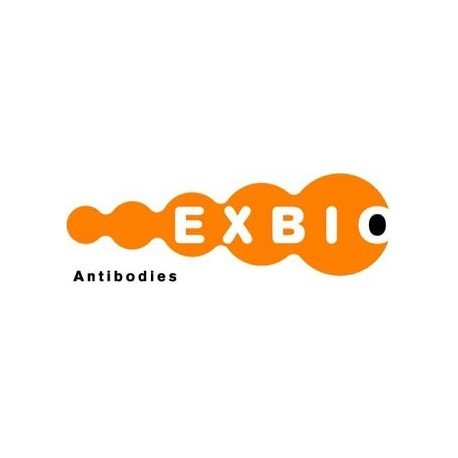Cart 0 Product Products (empty)
No products
To be determined Shipping
0,00 € Total
Prices are tax excluded
Product successfully added to your shopping cart
Quantity
Total
There are 0 items in your cart. There is 1 item in your cart.
Total products (tax excl.)
Total shipping (tax excl.) To be determined
Total (tax excl.)
Data sheet of Mouse Monoclonal to CD230 / Human Prion Protein (PrP)
| Brand | Exbio |
| Product type | Primary antibodies |
| Reactivity | Human |
| Clonality | Monoclonal |
More info about Mouse Monoclonal to CD230 / Human Prion Protein (PrP)
| Brand: | Exbio |
| Product no.: | 11-593-C025 |
| Product type: | Primary antibodies |
| Host species: | Mouse |
| Product name: | Mouse Monoclonal to CD230 / Human Prion Protein (PrP) |
| Antigen: | CD230 / Human Prion Protein (PrP) |
| Clonality: | Monoclonal |
| Clone: | EM-20 |
| Isotype: | IgG2a |
| Immunogen: | Recombinant human prion protein |
| Format: | purified |
| Specificity: | The mouse monoclonal antibody EM-20 recognizes human prion protein (PrP). Diglycosylated form of PrP has ~ 40 kDa, monoglycosylated form ~ 30 kDa, and nonglycosylated form ~ 19-21 kDa. This antibody is suitable for discrimination between normal cellular prion protein (PrPc) and its conformationally changed form (PrPSc) prion protein. |
| Categories: | CD and Related Antigens (Human), Neurobiology (Human) |
| Concentration: | 1 mg/ml |
| Storage buffer: | Phosphate buffered saline (PBS) with 15 mM sodium azide, approx. pH 7.4 |
| Storage / stability: | Store at 2-8°C. Do not freeze. Do not use after expiration date stamped on vial label. |
| Background: | CD230 / Human prion protein (PrP), also known as PRNP, is a ubiquitously expressed GPI-anchored cell surface glycoprotein associating with lipid raft components and functioning as a signaling molecule. CD230 / PrP plays a role in apoptosis in a cell context-dependent manner, is involved in proliferation of epithelial cells and in distribution of junction-associated proteins in human enterocytes. Conversion of this normal cellular prion protein (PrPc) into an abnormal conformer (PrPSc) is the crucial step associated with triggering the pathogenesis of the prion neurodegenerative disorders, such as the Creutzfeld-Jakob disease (CJD). Whereas PrPc is rich in alpha-helices, the PrPSc form has higher content of beta-sheets and is resistant to proteinase K. |
| Purity: | > 95% (by SDS-PAGE) |
| Purification: | Purified by protein-A affinity chromatography |
| Product specific references: | *Dvorakova E, Vranac T, Janouskova O, Černilec M, Koren S, Lukan A, Nováková J, Matej R, Holada K, Čurin Šerbec V: Detection of the GPI-anchorless prion protein fragment PrP226* in human brain. BMC Neurol. 2013 Sep 25;13:126. |
| General references: | *Li C, Yu S, Nakamura F, Yin S, Xu J, Petrolla AA, Singh N, Tartakoff A, Abbott DW, Xin W, Sy MS: Binding of pro-prion to filamin A disrupts cytoskeleton and correlates with poor _x000D_ prognosis in pancreatic cancer. J Clin Invest. 2009 Aug 17. pii: 39542. doi: 10.1172/JCI39542. [Epub ahead of _x000D_ print]_x000D_ _x000D_ _x000D_ , *Ermonval M, Baudry A, Baychelier F, Pradines E, Pietri M, Oda K, Schneider B, Mouillet-Richard S, Launay JM, Kellermann O: PLoS One. 2009 Aug 4;4(8):e6497._x000D_ _x000D_ , *Yang Y, Chen L, Pan HZ, Kou Y, Xu CM: Glycosylation modification of human prion protein provokes apoptosis in HeLa cells in vitro. BMB Rep. 2009 Jun 30;42(6):331-7._x000D_ _x000D_ _x000D_ , *Segarra C, Lehmann S, Coste J: Prion protein expression and processing in human mononuclear cells: the impact of_x000D_ the codon 129 prion gene polymorphism. PLoS One. 2009 Jun 4;4(6):e5796._x000D_ _x000D_ _x000D_ , *Wang X, Dong CF, Shi Q, Shi S, Wang GR, Lei YJ, Xu K, An R, Chen JM, Jiang HY, Tian C, Gao C, Zhao YJ, Han J, Dong XP: Cytosolic prion protein induces apoptosis in human neuronal cell SH-SY5Y via mitochondrial disruption pathway. BMB Rep. 2009 Jul 31;42(7):444-9._x000D_ _x000D_ _x000D_ |
| Related products: | - Mouse Monoclonal to CD24 - Mouse Monoclonal to CD231 - Mouse Monoclonal to CD235a / Glycophorin A |
| Shipping condition: | Room temperature |


